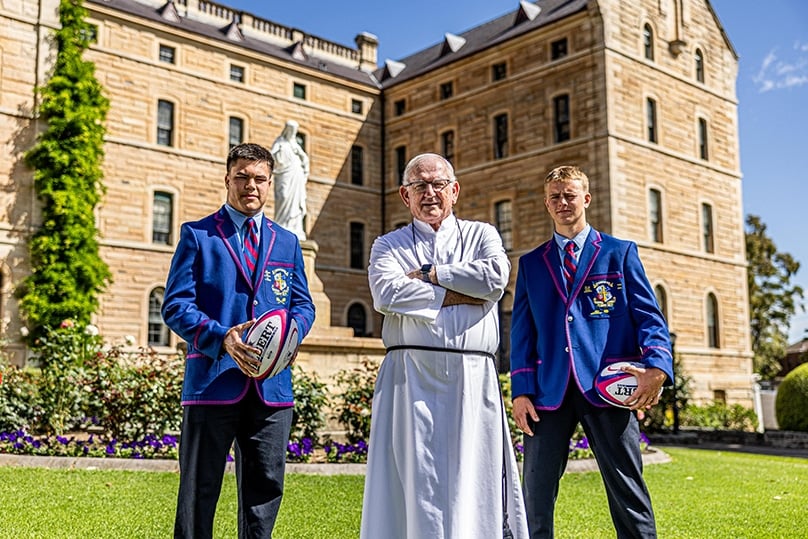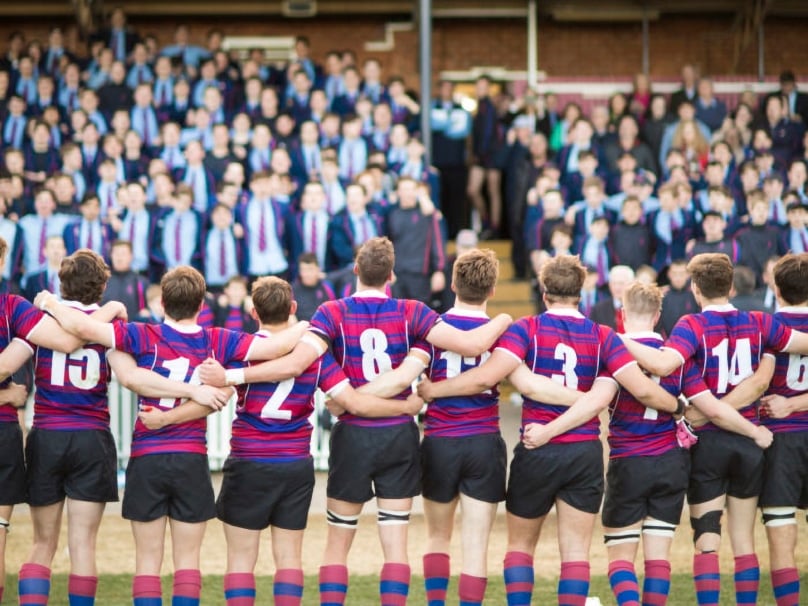
When scouring the 2023 Rugby World Cup Draw in early September deciding which games to wake up early for, the pool match between minnows Portugal and Fiji was by far the bottom of the list.
Fast forward to October and who knew that breezy Sunday evening in Toulouse would be the moment when Australian men’s rugby reached the lowest point in its long and distinguished history.
Not only has it suffered the dual humiliation of losing two world cup pool matches and failing to qualify for the quarter finals for the first time, we’re also hovering around our lowest world ranking ever.
Yet while enough commentary has been written on how to “save rugby” over the past fortnight to fill a set of encyclopedias, not one pundit has pointed out the simplest and most obvious answer to Australian men’s rugby’s prayers.
Just call in the Catholics and we’ll take it from here.
While soccer’s called “The Beautiful Game” and horse racing is known as the “Sport of Kings” rugby union’s entirely appropriate moniker is “The game they play in Heaven,” because there’s arguably no other group that’s contributed more to the national game than the Catholic Church.
While the Christian Brothers deserve their due—contributing greats like George Gregan, Steve Finnane, Morgan Tuinui, Owen Finegan and Michael Hooper—there is one religious order that has crafted creating Wallabies into a fine art form: the Marists.
From the great John Eales (Ashgrove, QLD) to the north, to Joe Roff (Canberra, ACT) in the south, the Eastern seaboard of Australia is dominated by Marist schools that can all call Australian sporting greats their own.
To put this disastrous world cup campaign in the rear-view mirror, it’s worth going back to basics and examining what is it about the Marist charism that has been the key to Australian rugby’s success during its golden age.
As National Director of Marist Schools Dr Frank Malloy states, it is not just rugby, but almost all sports that have had Marist alumni representing their country.

“It comes down to three simple things. Humility, Simplicity, Modesty—the three Marist spiritual virtues,” Dr Malloy said.
Marist students enjoy success in all their academic pursuits and sports because of the strong teaching moments that sports—in particular team sports—provide in the formation of character in young people, he added.
“Whilst primarily for pure enjoyment, all sports teach resilience, respect, and an appreciation of order and rules for the common good, while providing students with avenues to develop their unique gifts and talents, grow in confidence and be affirmed,” Dr Malloy said.
“At Marist schools, our aim is enriching the lives of young people so they grow into faith-filled, well-rounded adults so they are set up for life.”
When talking about Marist schools and their contribution to Australian rugby, the college that you cannot fail to mention is the undisputed nursery for future Wallabies, St Joseph’s College Hunters Hill.
Aptly nicknamed “Joeys,” with 47 Wallabies among their alumni, they have produced more Australian Men’s rugby representatives than any other school in Australia.
With instantly recognisable names such as Matt Burke, Tony Daly, Luke Burgess and Darren Junee all former students, Joeys has won nearly half (57 premierships) of the 125 years of the Great Public Schools of New South Wales (GPS) competition.
One man who coached the Joeys First XV to 11 of those premierships is Br Anthony Boyd, who believes when it comes to returning Australian men’s rugby back to its former glory, the philosophy must be finding the “rising tide to lift all boats.”
“We have our way of doing things, but there’s a lot of other great schools that combine sport and education for young men and women.”
Br Boyd states that while the Marist values provided the school with an edge, it was the strength of school rugby across all public, Catholic, and independent schools that led to Australia’s golden era.

“One thing we have lost is the depth of rugby in all high schools,” he said.
“We previously had a raft of amazing public rugby high schools with outstanding and dedicated coaches.
“Just one example that comes to mind is the late Tony Hannon from Sydney High School. He developed more Waratahs than perhaps anyone else and deserves more credit for his contribution to the game.”
Br Boyd is retiring as an educator, but still coaches the Joeys 15Fs. He believes Marist schools succeed because the focus is never only on winning but playing the game to the best of one’s ability—a lesson for sport and life.
“In schools we play sports for a whole lot of reasons, partly because of good health, but to build confidence, self-belief, self-respect, discipline, loyalty, sacrifice, working with others, but also learning how to deal with loss and being modest in victory,” he said.
When asking the great man how to fix Australian men’s rugby, Br Boyd has some opinions that he clearly would like to keep to himself. One observation he was happy to share, is that Rugby Australia will never find a solution with a top-down approach.
The long way back will take serious generational change with time for planning, patience, and long-term investment across all aspects of the junior game, so that we develop the best men’s and women’s teams for the future.
“The NSW Combined High Schools versus GPS game was always one of the toughest and most anticipated games of the season,” he said.
“I would love to see Australian Rugby invest more in High Schools. If you lose rugby in schools, you lose the sport for good.”
In short—this world cup we failed the test, so it is time for Rugby Australia to go back to school.
